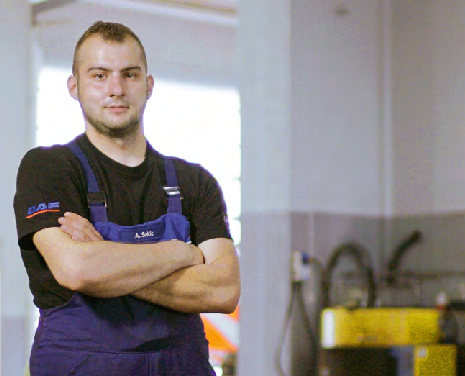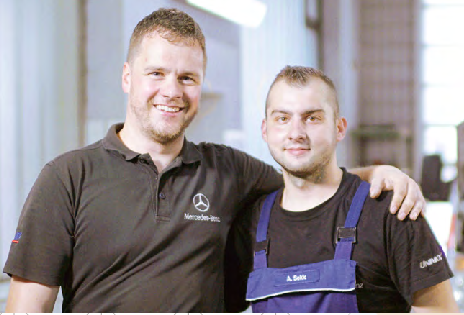Companies can utilise the recognition of professional qualification as a tool for attracting and retaining skilled workers in different ways: They can carry out the procedure independent of internal company processes and provide specific support to the applicant – for example, when submitting an application or by absorbing costs.
Another option is the integration of the recognition process in the companies’ HR work. Here are two successful examples:
The search for qualified specialists is like a Herculean task for two small craft businesses in Germany. But instead of burying their heads in the sand, they made the best of it and looked for specialists from abroad. In doing so professional recognition of qualifications was utilised as a development tool.
IN THEORY, WE COULD EMPLOY A “WORKER WITHOUT PROFESSIONAL QUALIFICATION” IN OUR REPAIR SHOP, BUT HE WOULD BE EXCLUDED FROM ANY TRAINING COURSES BY OUR CONTRACT PARTNERS.
Businessman in an authorised vehicle workshop
Regular advanced training is obligatory in a Bavarian vehicle workshop. In addition to self-imposed quality standards, due to expectations by the contract partner the workforce always has to be up to date with latest technologies. Hence, checking professional qualifications from specialists who have acquired their professional qualification abroad is a standard procedure in Germany. When a motor mechanic trained in Slovenia applied, the company developed a custom-made development plan – aiming to employ him as diagnosis specialist. This plan combined individual expectations and operational goals by setting specific milestones. Reaching a new milestone resulted in an adjustment of the salary in order to offer a financial incentive in addition to personal motivation.
Extract from the development plan:
Step 1: Improving general language skills in everyday business by joining an evening course
Step 2: Acquiring subject-specific language skills to qualify for in-house training
Step 3: External training related to commercial vehicles
Step 4: Recognition of full professional equivalence
Step 5: Addional education related to commercial vehicle diagnostics
Step 6: Preparation for advanced training as diagnostic specialist
MR S. IS HIGHLY TRAINED AND COMPETENT. THROUGH RECOGNITION OF HIS PROFESSIONAL QUALIFICATION HE IS NOW WELL SUITED TO WORK FOR OUR PARTNERS.
Businessman in an authorised vehicle workshop
A master electrician company in Munich also intends to employ qualified personnel. In order to employ foreign specialists, this small craft business has developed a two-stage procedure combining business needs of a small craft business and financial needs of employees by linking the recognition of professional qualification and a period of vocational adjustment:
First Stage: The specialist qualified abroad gets a one-year contract as unskilled worker (“helper year”/”assistant year”). Simultaneously, the recognition process is started and accompanied comprehensively.
Second Stage: In the second year and after recognition of the specialist‘s professional qualification he will be rewarded by full acceptance and a corresponding salary.
THE GERMAN ASSOCIATION OF ELECTROTECHNICS, ELECTRONICS AND INFORMATION TECHNOLOGY (VDE) STIPULATES TO EMPLOY SOLELY TECHNICANS WITH RECOGNISED PROFESSIONAL QUALIFICATIONS.
Master electrician from Munich

Mr. S. trained as a mechanic in Slovenia
The master electrician promotes and demands recognition of Mr. S’ professional qualification



